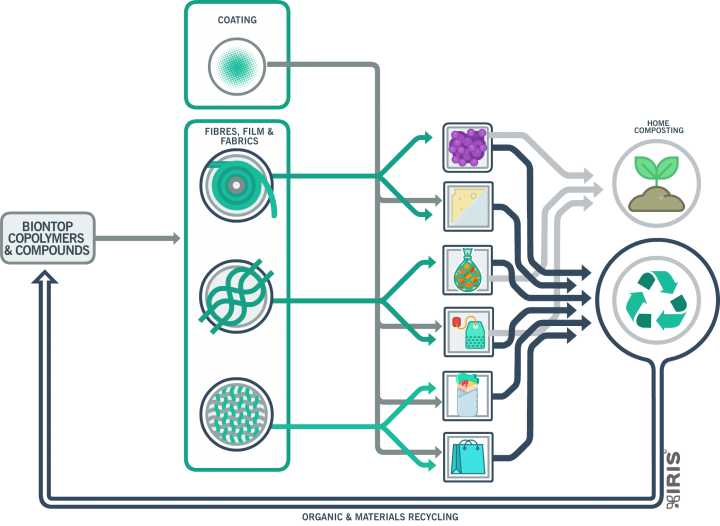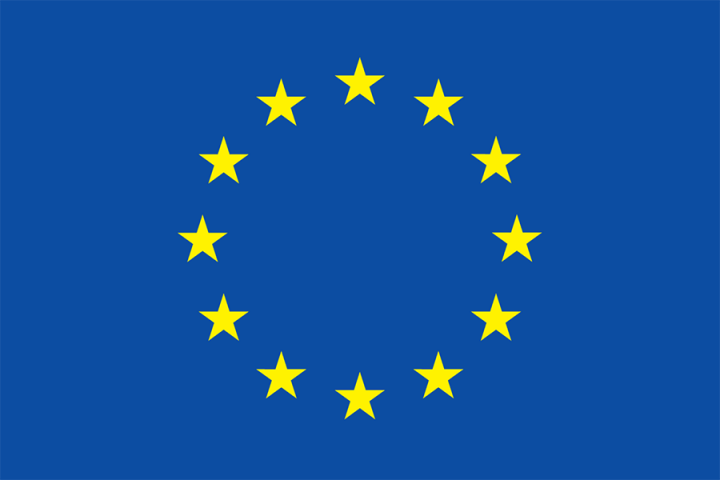Novel packaging films and textiles with tailored end of life and performance based on bio-based copolymers and coatings
Only 31% of plastic is currently recycled and plastic packaging still have a deficient end of life. Thus, improvements are needed to provide cost effective solutions with high bio-based contents and suitable performances for demanding packaging applications, with a consumption of 19M ton/year, while still achieving compostability in mild conditions.
Using sustainably sourced comonomers, additives and fillers to formulate novel PLA copolymers and compounds, the BIOnTOP project will deliver recyclable-by-design cost competitive packaging solutions that can be mechanically recycled, industrially/home composted or even suitable for anaerobic digestion.
Moreover, the barrier properties of delivered bio-packaging trays, films and derived packaging, will be enhanced using removable protein-based coatings and a novel fatty acid grafting technology to decrease permeability and compete with fossil packaging.
In the field of textile packaging , most used coatings are not bio-based and of different nature from the coated fibres, making material or organic recycling extremely difficult. New PLA coatings or fatty grafting will allow reprocessing without significant loss of properties.
BIOnTOP packaging, based on >85% renewable resources, will be compatible with a broad range of packaging applications’ requirements but also multiple end of Life options. Our materials will be biodegradable in home composting conditions but also recyclable for multiple use secondary packaging.
Based on new circular bioeconomy value chains, BIOnTOP will generate growth for EU bioplastics and end users’ industries in the food and personal care sectors with potential in many fields: BIOnTOP production is estimated to reach close to 9.6 Mton per year by 2030, overall leading to €40 M turnover and 170 new jobs. All in all, reducing the environmental footprint of plastics, our new bio-based packaging will have a significant positive social and environmental impact.
Objectives
The main goal of BIOnTOP is to deliver novel bio-based biodegradable packaging based on versatile copolymers and coatings that optimally preserve the packed products but also our resources (packaging based on significantly >85% renewable resources, partly produced from by-product biomass and recyclable). The different conversion processes as well as post-consumers waste sorting and recycling will be upscaled following advanced industry 4.0 approaches. Based on tailored PLA formulations and removable barrier or monomaterial coatings, BIOnTOP packaging will be compatible with a broad range of packaging applications’ requirements but also multiple EoL options (materials & organic recycling, home & industrial composting and biogas production by AD).

The aim is to develop new bio-copolymers, compounds, biocomposites and coating formulations and process them into:
- Recyclable, home-compostable monomaterial trays & films for fruits and vegetables.
- Recyclable, multilayer trays & films for MAP (modified atmosphere packaging) for e.g. dairy and personal care products.
- Home compostable & organically Recyclable nets for F&V.
- Home compostable & organically recyclable coated textiles e.g. woven fabric tea bags.
- Recyclable, reusable coated woven fabrics e.g. food wraps.
- Recyclable, reusable secondary packaging from SRM (secondary raw materials):
- Extruded blown bags.
- Non-woven bags.
Consortium
- Aimplas - Spain (co-ordinator)
- INSTM - Italy
- Centexbel - Belgium
- Albstadt-sigmaringen university - Germany
- European bioplastics - Germany
- Total Corbion pla bv
- PLANET - Italy
- BioMi - Croatia
- EMSUR - Spain
- CMSA - Spain
- SILON - Czech Republic
- Sioen - Belgium
- WEAREBIO - Estonia
- Entrepinares - Spain
- UBESOL - Spain
- OWS - Belgium
- Romei - Italy
- IRIS - Spain
- ARCHA - Italy
- ENCO - Italy
- MC - Italy
Project related Figures
Budget 5,4M € (BBI-JU contribution 4,2M€)
21 partners (4 RTOs, 9 SMEs, 6 Large, 1 pan EU industry association) and 7 BIC members plus Advisory board
8 countries

Horizon 2020
This project has received funding from the European Union’s Horizon 2020 research and innovation programme under grant agreement No 837761
H2020 – BBI JU
The Bio-Based Industries Joint Undertaking (BBI JU) is a €3.7 billion Public-Private Partnership between the EU and the Bio-based Industries Consortium. Operating under Horizon 2020, this EU body is driven by the Vision and Strategic Innovation and Research Agenda (SIRA) developed by the industry.
A strong European bio-based industrial sector will significantly reduce Europe’s dependency on fossil-based products, help the EU meet climate change targets, and lead to greener and more environmentally friendly growth.
The key is to develop new biorefining technologies to sustainably transform renewable natural resources into bio-based products, materials and fuels. This nascent sector is expected to grow rapidly and create new markets and jobs, and is already attracting substantial investments in the US, China and Brazil. The EU has the industrial, research and renewable resources potential. It is now a matter of deploying it in a sustainable manner to compete in the global bioeconomy race.




